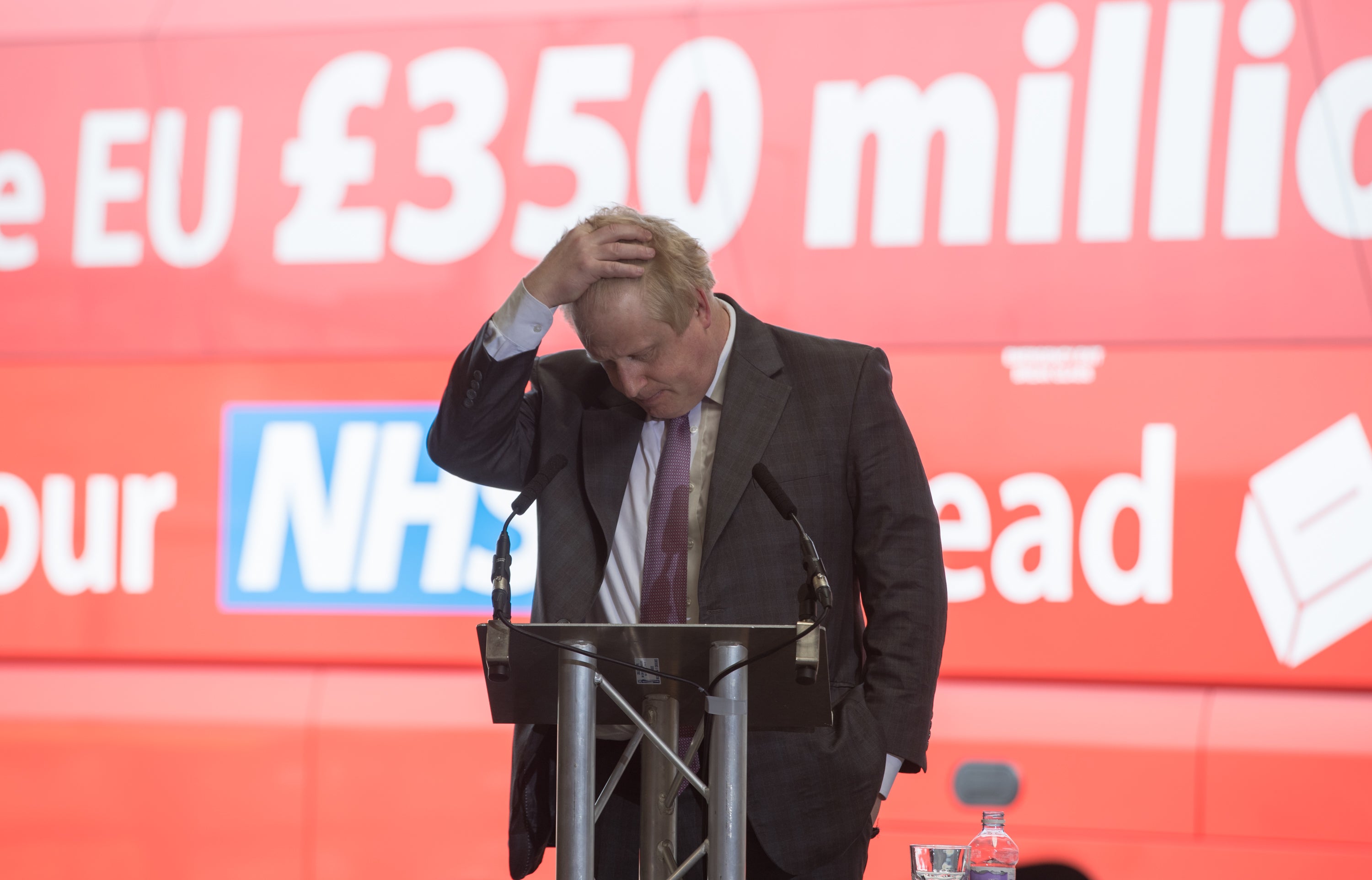The Brexit fantasy was never deliverable – voters fell for a confidence trick
Shortages in the labour market, along with the vacancies in the health service, hospitality industry and agriculture, are the living evidence of this self-inflicted act


Your support helps us to tell the story
From reproductive rights to climate change to Big Tech, The Independent is on the ground when the story is developing. Whether it's investigating the financials of Elon Musk's pro-Trump PAC or producing our latest documentary, 'The A Word', which shines a light on the American women fighting for reproductive rights, we know how important it is to parse out the facts from the messaging.
At such a critical moment in US history, we need reporters on the ground. Your donation allows us to keep sending journalists to speak to both sides of the story.
The Independent is trusted by Americans across the entire political spectrum. And unlike many other quality news outlets, we choose not to lock Americans out of our reporting and analysis with paywalls. We believe quality journalism should be available to everyone, paid for by those who can afford it.
Your support makes all the difference.I am, I understand, a “bemoaner”: one of the lost tribe of British citizens who voted to remain in the European Union and now, resenting our defeat, lose no opportunity to undermine the triumph of our opponents.
We are apparently oblivious to the scale of their achievement, blinded by our prejudice, and quite incapable of watching in admiration as the Brexiteers seize the opportunities they foretold and are now grasping.
What heady days they were in 2016 when Boris Johnson, David Davis and Liam Fox were entrusted with the three leading ministerial posts to turn promise into reality once the referendum was secured. No need to wait for the detailed legislation. This was the moment to do the heavy digging, construct new frameworks, devise a plan. We were free. We had our country back. The dead hand of Brussels was soon to be history.
This was the moment to reinvigorate the people’s enterprise with a list of the regulations soon to be consigned to the bonfire. Our own trade deals, suited to our economic circumstances, with countries across the world, in place of those imposed on us by the single market. Borders slammed shut, except miraculously in Northern Ireland, where they wouldn’t exist at all. Britain once again being respected in the corridors of world power.
Two years later, the heady rhetoric of nationalism was a central component of the election campaign to get all this “done”. It worked. A massive majority removed any last obstacle between us and the promised land.
Or so it seemed. Lord Frost, the man who had masterminded the technical legislation to turn all the phrases into reality, resigned. He was unconvinced by the direction of travel as he sensed it, after such close contact with his fellow Brexiteer ministers.
There is another explanation: the case presented to the British people, which secured such a small majority in the referendum, was based on a pack of lies. It was never deliverable.
I am the first to recognise that regulations are irksome to businesses seeking new openings. I know that I am responsible for a significant number of such rules, put in place to protect the environment, the countryside, our heritage and our wildlife. The many colleagues with whom I shared ministerial experience would take equal pride in the regulations they introduced to raise standards of safety, promote health, prevent exploitation in the workplace, and achieve a range of other purposes that convert the free-for-all of the jungle into civilised society.
The single market was a plan to replace the different standards of each member country of the community with a single set, which would give industrialists much longer production runs and provide citizens with a simplified code of behaviour. Margaret Thatcher was an early convert, and rightly so.
We are a trading nation, and the terms on which that trade is conducted are of crucial importance. Virtually all the expert analysis points to countries being poorer outside the community. There is little surprise here, as over 40 per cent of our trade is with our neighbours.
We were promised that any dip would be more than compensated for by an enthusiastic world waiting to replace our community-designed deals with bespoke deals tailored to our own economy. There have been some 60 trade deals since we left the community. Virtually all of them are simply rollovers of those said to be so prejudicial to our interests. There is a different one – with Australia – and this is to be phased in over many years, which tells you all you need to know about its threat to British farmers.
Of course, every tub-thumping orator knows the potency of the immigrant as a focus for discontent. Brexiteers played the card with ruthless efficiency. A million people got the message and left this country to return to their native homes. They were skilled and talented citizens who contributed significantly to our wealth and wellbeing.
Shortages in the labour market, and the vacancies in the health service, hospitality industry and agriculture, are the living evidence of this self-inflicted act. A clear consequence of the communications revolution has been to lay bare the stark contrasts in wealth across the globe.
Overwhelmingly, today’s immigrants are young, energetic and skilled. They are attracted by the sort of society we take for granted. They want to contribute to that society and make it a better place for themselves and their families.
And while we cannot realistically welcome all those who would like to come, we won’t solve this ethical and economic challenge by pulling up the drawbridge. It is our moral duty – and in our enlightened self-interest – to provide investment and support to developing countries around the world. We should join our neighbours in a determined and concerted effort to create wealth in those countries from which immigration originates.
To keep up to speed with all the latest opinions and comment, sign up to our free weekly Voices Dispatches newsletter by clicking here
Only by working together across Europe can we resolve conflict and end abuses of human rights, so that everyone can have access to opportunities where they are born. We must prioritise this if we are to end the desperation of entire families uprooting and travelling perilously across the world for a life without fear, threat or poverty.
But it is absurd to pretend that migration can be dealt with by any one country alone. The crisis we see across Europe is still in its infancy, and global warming, with its floods and scorching, will accelerate it. This country should be encouraging our European neighbours to devise policies akin to the Marshall Plan after the Second World War.
The next 12 months are going to be very difficult. Inflation and rising taxes will lead to falling living standards. In its attempt to deflect criticism, we can be sure that this government will do its utmost to shift responsibility onto our European neighbours, with no justification.
The European Movement will be resilient in challenging such tactics. We are committed to restoring this country’s place at the heart of Europe. It will take time, but there is no excuse for delaying that process by a day longer than necessary. Already the polls are showing clear evidence that the British people know and resent the confidence trick pulled on them. Our task is to articulate our people’s real interests, and restore the next generation’s confidence so that they will one day fill the empty seat in Europe that we bequeathed them.
Michael Heseltine is president of the European Movement and a former defence secretary
Join our commenting forum
Join thought-provoking conversations, follow other Independent readers and see their replies
Comments